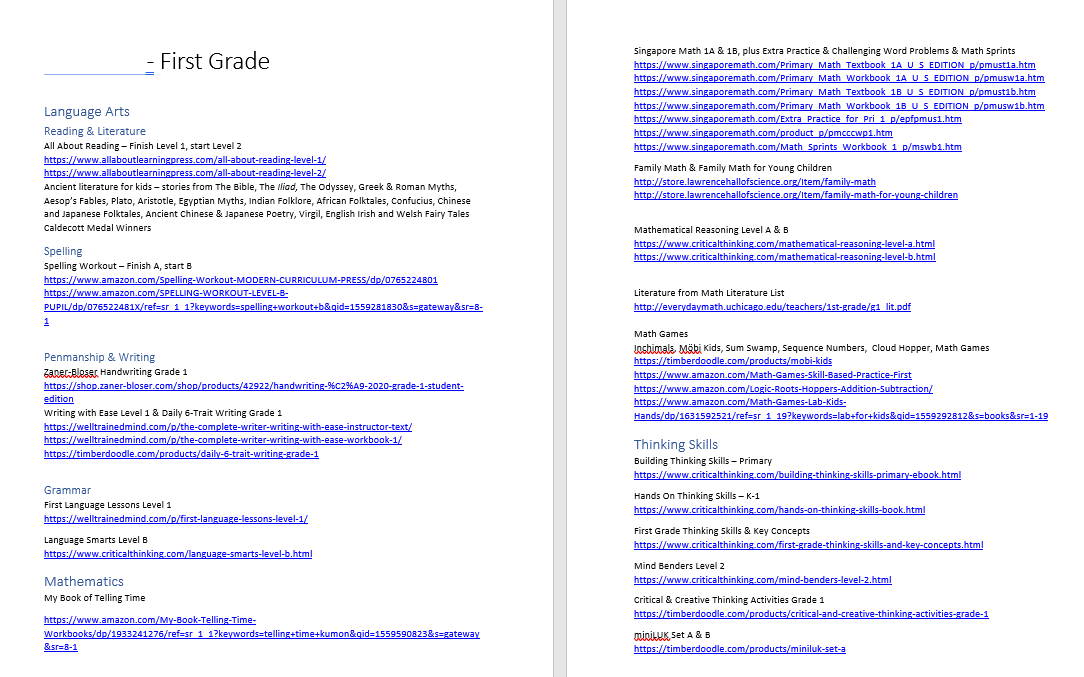I’m joining in the Timberdoodle Blog Hop again today, and I wanted to talk about planning. I’m a big fan of planning. I feel like even if I don’t follow the plan exactly, if I have a plan, that’s a huge boost to getting things done. It helps to eliminate the risk of decision fatigue. There are lots of great tools out there for doing this, and perhaps at another time I’ll do more detailed reviews of some of the options. For now, though, I want to give an overview of what you can use to plan your homeschool.

Paper Planners
There are many different paper planners out there – Happy Planner and Erin Condren are two of the biggest providers that are popular with homeschooling parents. There are also bullet journals (which I prefer). Paper planners are just how they sound. I use a paper planner post-work. I use a composition notebook and write down exactly what we did in each subject. That way, I just pull it out to see where we finished the week & to update my plan for the following week.
Excel or Google Sheets

Right now, because we were thrown back into homeschooling, I’m using an Excel spredsheet just so I can get a general overview of the week. I’ll adjust as needed for the following week – for example, if I find it takes two days to complete a lesson in our reading curriculum, I’ll account for that (that’s one of the big reasons I like using the paper planner to record what we actually do). This allows me to see what supplies I’ll need for the week & plan accordingly. If our library were open, it would also allow me to make sure that on Sunday we pick up what books we’d need for the week as supplimental resources.
Microsoft Word or Google Docs

This is where I do my long-term planning and my brainstorming for curriculum ideas. In the above image, I have links to all the different resources. I’m not going to actually use all the resources listed, but I still like to go through, make notes of everything I’m interested in, and have it all in one spot. That way if one curriculum choice doesn’t work well or if I find we need extra help in an area, I don’t have to go searching. I can just go to my document, click on the link, and go to the page where I found the resource.

It’s also where I lay out the lesson plans for the entire year for each subject. I outline everything we will cover for a specific subject, then find resources, choose some science projects, research videos and documentariess that are available, etc. Again, this is a lot of up-front work, but then it makes life easier later when we’re knee-deep in talking about evolution and I want to remember which videos I’d found that were age-appropriate for the subject matter and what science projects I found to do that week. This isn’t something I’ll do while we’re temporarily homeschooling to the end of the year – my goal is to make sure the remaining standards are met – but it is something that I’m doing for the next level of subjects.
Homeschool Tracker

If you’re looking for an online tool that also allows your students to sign in, Homeschool Tracker is a good resource. It allows you to track anything you can possibly want to track with your homeschool. I will likely go back to this depending on what happens with COVID-19. (and use it in place of Excel) It’s really robust, and it’s handy and you can create transcripts with it. It costs $8 a month, and yes, there is an annual subscription discount.
It definitely is a more handy tool when you have older children who are independent – because they can sign in and see their assignments and chores. You can also enter in those state standards we talked about, and track which assignments link to them – this actually came in really handy with my oldest when we put him in public school for 8th grade. It helped with placement.
So there you have it. These are the tools I use when I’m planning for homeschooling. I’m a classical homeschooler, so that means I do follow the Trivium, depsite being secular, and I do have a much more traditional school approach with lesson planning and tracking. Unschoolers likely will not use these tools – and maybe an unschooler can weigh in on the comments to talk about what they do with tracking/planning in their homeschool.
Be sure to check out some of the other blogs in the blog hop:
You are invited to the Inlinkz link party!Click here to enter







